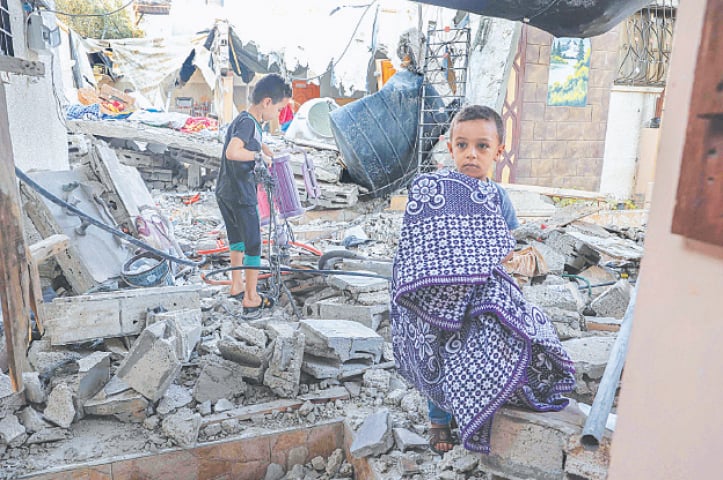
GAZA CITY: Shell-shocked Gazans on Monday sifted through the rubble of three days of deadly conflict between Israel and Islamic Jihad militants as a truce held and life slowly returned to normal.
An Egypt-brokered ceasefire reached late Sunday ended the intense fighting that killed 44 people, including 15 children, and wounded 360 in the enclave according to Gaza’s health ministry.
Israel had since Friday launched a heavy aerial and artillery bombardment of Islamic Jihad positions in Gaza, leading the latter to fire over a thousand rockets in retaliation, according to the Israeli army.
As relative calm returned to Gaza on Monday, and electricity was restored, Palestinians tried to salvage their belongings from the rubble of shattered homes and to start clearing the debris.
Israel and Islamic Jihad warn each other of response if ceasefire violated
“We received the news of the ceasefire with joy and happiness and we went back to our work,” said Gaza shopkeeper Hazem Douima. “We did not want more bloodshed.”
Bereaved families buried their dead, including at one funeral joined by hundreds of mourners in Jabalia in the northern Gaza Strip where a family laid to rest four minors killed in the conflict.
“Gaza is tending to its wounds,” said one resident, Mohammed Alai.
Gaza’s sole power plant, after a two-day shutdown, “started working to generate electricity”, said spokesman Mohammed Thabet, hours after fuel trucks passed the reopened good border crossing.
The outage had sparked fears about the impact on hospitals overwhelmed with casualties amid Gaza’s worst fighting since an 11-day war with militant movement Hamas last year.
‘Right to respond’
The Israeli military said roads would gradually reopen in the border area where restrictions were imposed in the lead-up to the offensive, which Israel said was launched to stop looming attacks.
Three people in Israel were wounded by shrapnel and 31 lightly hurt while running for safety, emergency services said.
Israeli Prime Minister Yair Lapid’s office late Sunday agreed to the truce, but said that “if the ceasefire is violated”, Israel “maintains the right to respond strongly”.
Islamic Jihad also accepted the truce, but said it too “reserves the right to respond”. US President Joe Biden welcomed the truce and thanked Egyptian President Abdel Fattah al-Sisi for Cairo’s role in brokering it.
European Union foreign policy chief Josep Borrell warned that it was “crucial to work to consolidate the ceasefire”.
Tehran said it will always “defend the active resistance”.
Islamic Jihad said 12 of its leaders and members had been killed. The groups Mohammad al-Hindi said the ceasefire deal “contains Egypt’s commitment to work towards the release of two prisoners”.
They were named as Bassem al-Saadi, a senior figure in the group’s political wing who was recently arrested in the occupied West Bank, and Khalil Awawdeh, a commander, also in Israeli detention. North of Gaza in the Israeli city of Asheklon where air raid silents had wailed and people fled to bunkers, beachgoers returned to the Mediterranean shore.
Sitting in a cafe, Eitan Casandini said locals were feeling “very good”. “After we destroy them we can sleep peacefully,” he said. “I don’t think (Islamic) Jihad will do anything again in the next three or four years.”
Islamic Jihad is aligned with Gaza’s rulers Hamas but often acts independently.
Hamas has fought four wars with Israel since seizing control of the enclave in 2007, including the conflict in May last year.
Israel has said it was necessary to launch a “pre-emptive” operation against Islamic Jihad, while the diplomatic official said the group had been planning an attack by sniper fire or with anti-tank missiles.
The army killed senior leaders of Islamic Jihad in Gaza, including Taysir al-Jabari and Khaled Mansour. The senior Israeli diplomatic official said Islamic Jihad had been dealt “a very serious blow” which had “taken them back decades”.
Published in Dawn, August 9th, 2022










































Dear visitor, the comments section is undergoing an overhaul and will return soon.